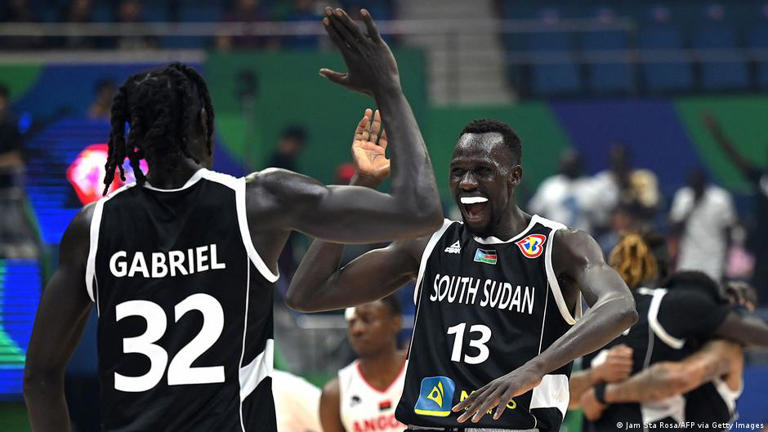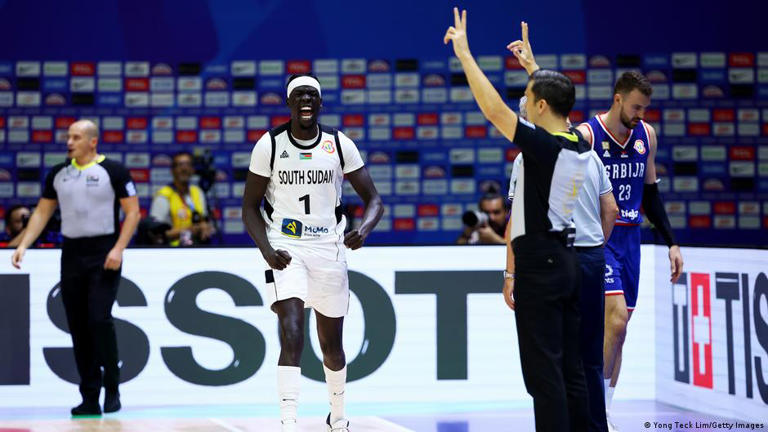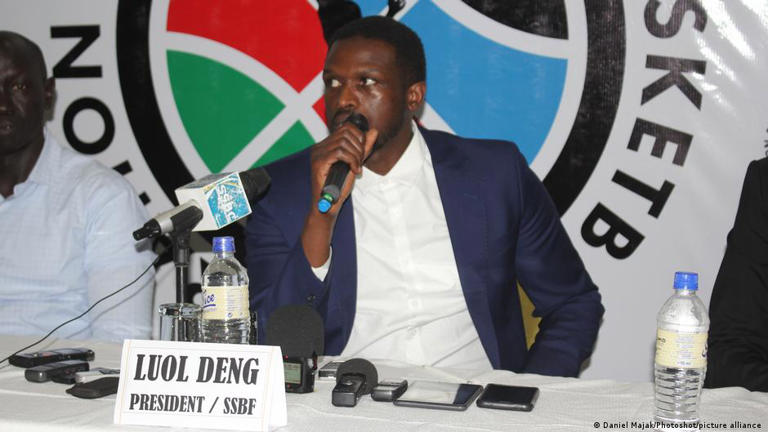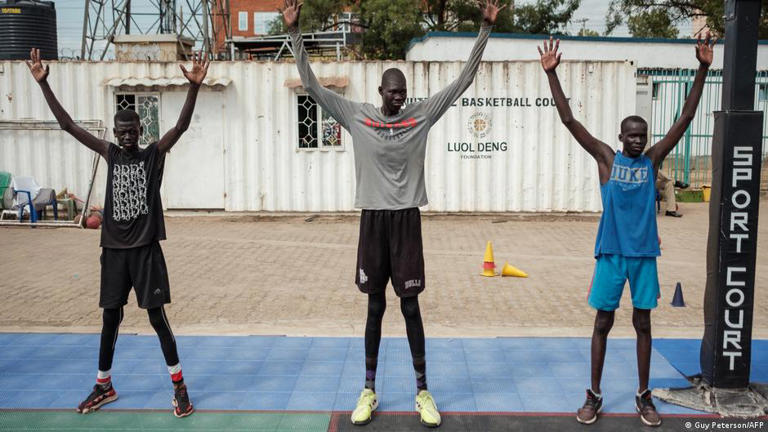The Bright Stars have qualified for their first Olympics following an impressive campaign at the FIBA World Cup. Former NBA star Luol Deng built a team from the diaspora that has brought joy to the country.
Up until last week, the biggest sporting achievement of South Sudan was qualifying for the FIBA World Cup.
They topped that achievement by booking a ticke to the Olympic Games at the FIBA World Cup, causing celebrations in the streets of the capital, Juba, and surrounding towns and villages.
Their 101-78 victory over African powerhouse Angola handed them the automatic African ticket for Paris 2024. The fans who watched inside the Nimra Talata Basketball Stadium danced and waved the national flag in celebration.
“I am so happy that it is happening,” Deng told DW at a welcome reception in Juba on Wednesday, where the team has been feted for its impressive performance. “We play for more than the game. That’s because of the love that we get and what it does to everyone.”
Deng, who moved to the United Kingdom with his family as a young refugee and represented the UK at the 2012 Olympics, was once an All-Star in the NBA with the Chicago Bulls. But even he says that the accolades that the Bright Stars have received are unique. “I played in the NBA, but I was never loved like that,” he said.
A diaspora of talent
Blessed with the height and love of the game — Manute Bol and Ring Ayuel being two of the most famous big men from the country — Deng saw the opportunity the sport could offer for national growth and rejuvenation as he gathered players from the diaspora to represent their homeland.
South Sudan played their first official international game only six years ago. In 2021, they qualified for their first continental competition, the Afrobasket, and finished seventh of 16 teams.
The Bright Stars fought through a stacked African qualification field and made it to their first World Cup this year. As the team prepared for the tournament, allegations of corruption dogged the sports ministry, who were accused of mis-spending funds meant for transporting fans to support the team. But in Manila, the Philippines, they won three matches, including against China and the hosts, to finish as Africa’s best team and pick up a Paris 2024 ticket.
“We have gone from not being recognized in the world to using basketball to change the belief of so many people about our country,” said Deng. “I’m not saying that everything is 100% sweet; there’s a lot of holes that still need to be filled, and we recognize that.”
Support needed for sustainability
28-year-old forward Nuni Omot, born in a Kenyan refugee camp as his parents fled the second Sudanese civil war before settling in the United States, described the unbelievable experience. “I’m just very blessed and honored to be able to do this with my brothers. There’s no other feeling like being able to bring positivity to the country,” Omot told DW.
“The media portrays South Sudan as a bad place, but for us to lift the flag and show the positivity, obviously for the next generation and generations to come, is historic and something that can’t be taken away from us.”
South Sudan has just four outdoor basketball courts, with 11 more under construction. It is the only country to have played at the World Cup without an indoor court anywhere in the country. The civil war had taken a toll on the growth of sports and cultural activities, but now, their flag will fly high at the next Olympics.
However, much work still needs to be done to create a sustainable basketball program at home. Busara Rajab, a South Sudanese basketball expert who has coached several teams and players for 16 years, hopes schools can be the pathway to growing the sport.
“Any sport needs big support. If you want a player to train for six hours a day, you cannot find it here in Juba because we don’t have many basics to help us,” Rajab told DW.
‘We need infrastructure’
The team’s captain, Kuany Ngor Kuany, 29, raised in Australia, where his parents fled when he was nine, added that proper facilities would help homegrown players. “Hopefully, soon, we will see the infrastructure that the federation built (across) the ten states,” he said.
“But to get to that level where we have homegrown talent, we need a lot more infrastructure and indoor basketball courts for us to be able to compete at the elite level.”
Arou Ramadan Chan, Deputy Secretary General of the South Sudan Basketball Federation, said they have plans to ensure the game grows at home. “We will continue pushing for that because we know that the same crop of players playing for our national team has the same DNA with those kids in Rumbek, in Torit and Bahr el Ghazal,” Chan said.
As Deng and his young team continue to enjoy their celebrations, they are already creating more progress than South Sudan’s politicians have achieved for the country.
Edited by Michael Da Silva
Author: Lolade Adewuyi, Waakhe Simon Wudu
Source:DW






